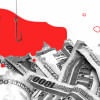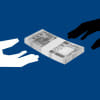Act now to save banks from graft
Noted citizens, including economists and former caretaker government advisers, yesterday urged the government to ensure punishment of perpetrators of crimes in the banking sector.
Or else, graft would destroy the sector, they said.
The banking sector is struggling because the boards of directors of banks are overtly politicised, banks lack honest officials, and above all the central bank itself has been exposed to vulnerabilities, they said at a discussion.
Socio-political platform Nagorik Oikya arranged the discussion on corruption at the capital's Jatiya Press Club yesterday.
Salehuddin Ahmed, a former governor of Bangladesh Bank, said there was discipline in the banking sector and banks were running smoothly until 2009. The disorder that followed is an ominous sign, he said.
“Bringing politics into the board rooms and inside banks cannot be acceptable under any circumstances,” he added.
He said there were good norms and regulations for the banking sector but those were not being properly followed.
Despite unravelling of several scams, the government did not take any visible steps, he said, urging that honest and dedicated bankers be given opportunities and the corrupt ones punished.
Noted economist Prof Anu Mohammad said corruption in banks has reached such a level that now people are nonchalant when they hear about Tk 100 or Tk 200 crore scams.
Bangladesh Bank is supposed to be the most secure and safe institution “but money has been stolen from there and we don't know who the thieves are”, he added.
The professor of economics said the country's banks have turned into “bottomless baskets” due to graft. “Whatever money you deposit, it will be gone,” he said.
Prof Anu Mohammad said despite the corruption and theft in banks, the economy is alive largely because of remittance and foreign currencies earned by the garment industry.
He said alongside religious fundamentalists, another group has emerged -- “fundamentalists in the government”. Their ideology is to not let anyone raise questions.
The goal of the present government is also the same, he said, adding, “In this situation, raising questions is a must.”
M Hafizuddin Khan, adviser to a former caretaker government, said despite receiving widespread allegations against former BASIC Bank chairman Sheikh Abdul Hye Bacchu, the government removed him with “due honour”.
He said the country was being run by an “elected dictatorship”.
Nagorik Oikya central committee member Zahed-ur-Rahman in the keynote paper said some big names have already come up as suspects in financial crimes.
“But common sense says there must be even bigger names because they could not have indulged in such corruption alone,” he said.
Prof Asif Nazrul, a law teacher at Dhaka University, said lack of accountability and absolute concentration of power were the reasons behind the corruption.
He said despite having a large population, Bangladesh is run by a central government.
“We used to say that all the powers were with one party or a few people, but now they are with just one individual,” he said.
Chairing the discussion, Nagorik Oikya convener Mahmudur Rahman Manna called for unity of civil society members and urged people to work for an inclusive general election scheduled for later this year.
Terming the Awami League-led government a “fascist government”, he said it was not letting people speak against its misdeeds.
Former caretaker government adviser Moinul Hosein, Gonoshasthaya Kendra founder Zafrullah Chowdhury, and Disaster Forum Member Secretary Gowher Nayeem Wahra also spoke at the discussion.

 For all latest news, follow The Daily Star's Google News channel.
For all latest news, follow The Daily Star's Google News channel. 








Comments